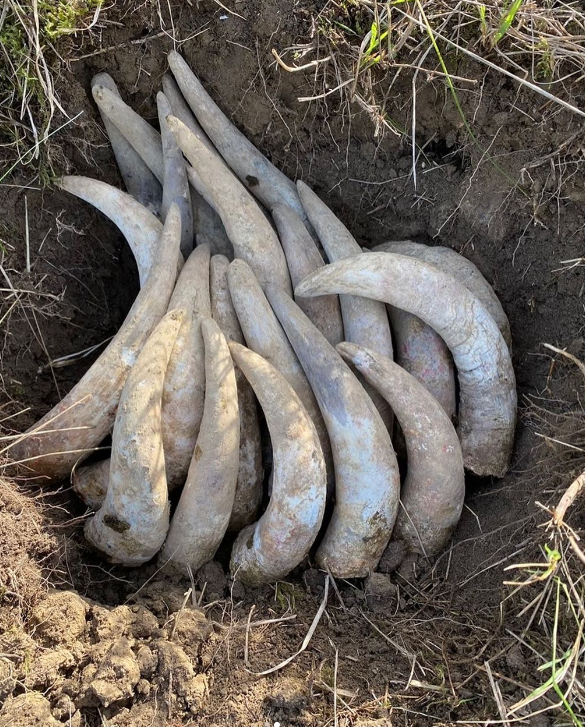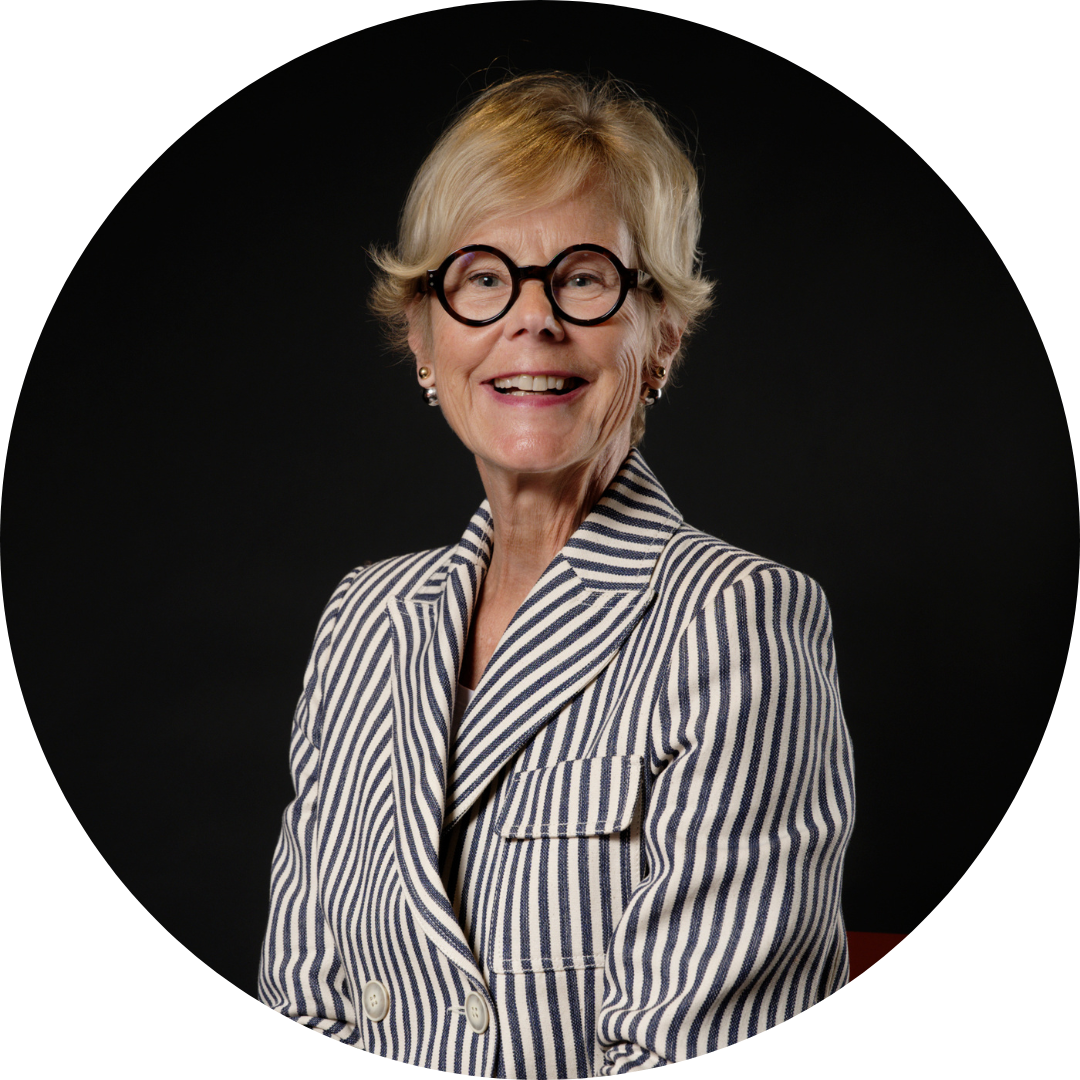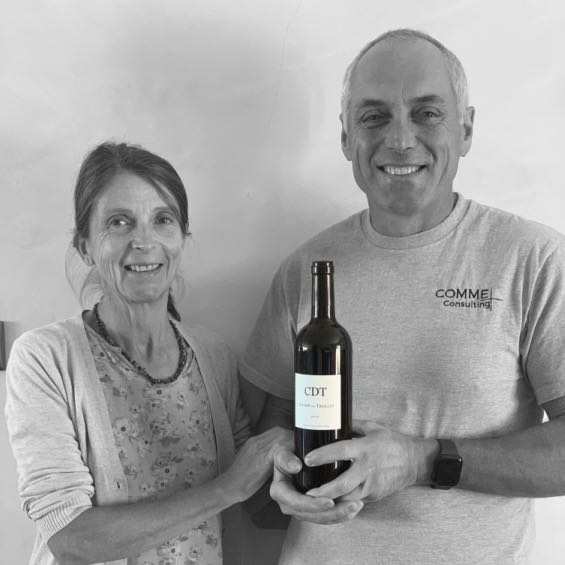Jean-Michel Comme and his wife Corinne
Comme Consulting
Consultants
Met by Gerda
After Eric Boissenot, Thomas Duclos, Stéphane Derenoncourt and Axel Marchal it was time to interview Jean-Michel Comme. He has been the Technical Director of Château Pontet-Canet for 31 years and has done a great job in converting the vineyard to biodynamic viticulture. This organic/biodynamic adventure started in 2004. The total changeover took place in 2005 and led to certification in 2010. Château Pontet-Canet was the first of the Grands Crus Classés in 1855 to be certified. It was a precursor in this process in Bordeaux. Many Châteaux followed, including Palmer, La Lagune, Durfort Vivens, Haut-Bages Libéral, Ferrière…
Jean-Michel Comme created his consulting company in February 2021 and is supported by his dynamic wife Corinne, also a biodynamic consultant. They own a beautiful vineyard in Sainte Foy La Grande: Champ des Treilles. Corinne was also present during the interview. The biodynamic fiber brings a beautiful synergy between them.
Gerda: Tell us about you…
Jean-Michel Comme: I am a great lover of vines
Corinne adds spontaneously: Jean-Michel has sap in his blood. He “lives” vine. It is his whole life.
Gerda: What are the main challenges you personally face in the practice of your work?
Corinne Comme: It should be noted that Jean-Michel’s consulting approach is a global one, going beyond the vineyard. We set up a real accompaniment of the teams. Indeed, it is not easy to accept the major changes that biodynamic viticulture implies. We often have in front of us, people who feel a problem but do not always manage to define it, in any case they seek the best for their vineyard.
Jean-Michel Comme: Too often, we consider the vine as a simple machine to produce grapes. Obviously, this is a false vision, at least in the production of quality wines. The vine is a living being. We have to establish another relationship with the vine (such as anticipating the disease that can affect it), but also another relationship with the people around it: the winemakers, the sales and marketing people. It’s an interconnected ecosystem!
For example, don’t wait for the problem to be expressed. We must anticipate it and apply a coherent strategy. The latter is multifaceted, including even the relationship of humans to the vine, its soil, water resources, etc… Our vision is global by creating synergy between the various parameters.
Gerda: How would you describe the personality you try to give to the wines you consult? Is there a “Jean-Michel Comme style”?
JMC: No, I don’t want to impregnate my signature. Each terroir is different and must be respected accordingly. My goal is to serve the place, not to use the place.
Gerda: Do you only consult in Bordeaux?
JMC: No, I consult in other regions like Macon. It is a beautiful and sincere project with a real human dimension. My clients have become close friends. This is also the meaning of my commitment. To give priority to human relationships.
I also work abroad. Above all in California in collaboration with my son Thomas. We have developed know-how there to free ourselves totally from irrigation.
For the past year, I have been working in Armenia where the client, who has also become a close friend, has taken up the challenge of being the first vineyard in the country without irrigation. This was one of my conditions to start this adventure which has a civilizational dimension in this country that has suffered so much. I am proud of the work we are doing!
My goal is the same for each vineyard: “to transmit a know-how, to give the key to reading and understanding the living”. I want to help people become autonomous and have the tools to choose the destiny of their vineyard as they wish.
CC: It is very important not to copy and paste. Interaction is fundamental with the place and its managers. We must have this proximity to understand the area and its possible problems. “Understanding” is the keyword because each place is different. Jean-Michel and I have two children, yet they are very different. For the terroirs, it’s the same thing!

The future
Gerda: You were technical director of Pontet-Canet for 31 years, and one of the first prescribers of biodinamics in Bordeaux, what changes do you notice in your job?
Jean-Michel Comme: The management of human resources is becoming more and more complex as well as the administrative burden. For the winegrower, the amount of time devoted to the vine and the wine is inexorably decreasing.
Another major evolution in viticulture is the change of opinion about biodynamic and organic farming in general. However, the situation is not as simple as it might be.
On the one hand, there is a lack of mastery of biodynamic viticulture. Too often, it is limited to applying the same recipes everywhere and all the time, without any real link with the terroir, the grape variety and the climate of the moment. This is detrimental to efficiency and therefore to the acceptance by the profession; because if sometimes the result is good, it also can be bad, it is necessary to be able to have a critical mind on our own approach. The lack of mastery of the approach, or simply the lack of knowledge of the reasoning, leads to disappointment and weariness. Biodynamics is not an end in itself, but a tool to produce a better quality harvest with more security.
On the other hand, the organic viticulture has experienced a strong development these last years, but the use of copper and sulfur alone is a very short answer for real efficiency in difficult years. We must not take it as a fatality by integrating “necessary harvest losses”. On the contrary, it is necessary to put in place the means so that everything goes well. To do this, it is necessary to work with a global vision. This requires to always think about the triptych terroir-variety-climate; of which I spoke previously. Each one of us brings his own “personality” to a given situation.
Both conventional and organic farming consider disease as the cause of the problem. On the contrary, in our understanding of biodynamics, disease is a consequence of an imbalance in the plant. We must first understand this imbalance and then solve it beforehand, notably with herbal teas adapted to each situation. Then, everything becomes easier!
And above all, there is no opposition to “official” science. We are able to explain a phenomenon using both approaches. Corinne and I remain biodynamic winegrowers with a scientific background!
G: How can winemakers protect themselves against climate change?
JMC: The day the winegrowers will have updated their cultural practices, the first step in the right direction will have been made! All the practices such as leaf removal, trimming, fertilization, trellising, weed control, (…) need to be re-evaluated in this dimension… There are so many things to change!
CC: As Jean-Michel said earlier, we work with our son, who is a consultant in California. His experience in this wine region has shown us the need to be more parsimonious in our actions. The question we have to ask ourselves throughout the year is, “Do we really need to do this?”
The plant must be taken care of in its entirety. Moreover, we must not forget that everything has a cost, not only financially but also for the resources from the environment that are necessary for the plant; like water for example. We love to exchange with our son, there is a real synergy between us three. Each one has its own vision, its own personality and enriches the other. I can tell you that we are happy to contribute every day to a better understanding of life and we always do this work with pleasure!
G: What are the grape varieties of the future in Bordeaux?
JMC: These are our current major grape varieties and perhaps “secondary” grape varieties, such as Malbec and Carmenère for example. Adapting to the climate is one thing, but adapting to the terroir is another; it is just as important. Thus, the Bordeaux grape varieties are particularly well adapted to the Bordeaux terroirs. We are not sure to have better elsewhere…
CC: Before thinking about changing grape varieties, it is necessary to think about the management of the soil, the trellising and the trimming. These are the first things to review before thinking about changing grape varieties. If the decision to change is taken, you have to be very sure of your facts because it will take years to find old vines and thus a quality production…. So, it is better to think twice…
G: The Franc de pied – fashion effect or real interest?
JMC: This is a subject that has interested us for a long time. The Franc de Pied by itself is indeed fashionable. What is the use of planting a vine when we already know what is going to happen: it will probably die before reaching adulthood because phylloxera is always present. The viticultural practices must allow the vine to have an acceptable life span to reach a sufficient quality. Let’s not forget those old vines are the basis of great wines…
We were especially interested in the origin of the contamination: why the phylloxera arrived. In Armenia, for example, the vines are Franc de Pied, not rootstock. The Caucasus barrier may have played a protective role over a short period. But over a century and a half, the exchanges would have allowed the contamination; which is not the case. This suggests that there is certainly something in the soil and/or the climate that allows this “insensitivity” to phylloxera. From the moment grafting was invented, 150 years ago, research to understand the phenomenon of contamination stopped. It is a fascinating subject and we are working to try to provide a solution for the future. We should be able to propose solutions in the near future.
CC: We have to solve this question: why did phylloxera arrive and become a big world problem overnight? As long as the answer has not been found, it is not possible to plant Francs de Pied without the risk of phylloxera.
There is also the subject of the sexual reproduction of the vine which does not intervene anymore. Before, the monks or nature did this work. Now, it is no longer the case and things have become even worse with cloning which allows multiplying infinitely a single plant. There is surely a genetic fatigue of our current grape varieties.

The wine
Gerda: What do you think of wine ratings?
Jean-Michel Comme: At this time, I think the wine rating is already outdated. The cards have been reshuffled with social networks, forums, influencers… They are the new influencers. Today’s consumers expect an ethical, coherent and respectful approach, and not only for wine and vineyards. Wine that is very good but not made under ethically acceptable conditions no longer corresponds to today’s consumers, especially when it is a great vintage. We can even ask ourselves if the race to technology and energy consumption is still a necessity to make wine… We could perhaps take advantage of this to return to a simpler, more direct and less disembodied relationship between the winegrower, his vineyard and his wine.
G: Regarding 2018, 2019, 2020: what do you think about these three great Bordeaux vintages?
JMC: 2019 is a good vintage but I don’t have the feeling that it is a great vintage. By seeing great vintages, consumers no longer believe us! The 2018 growing season was difficult but it allowed us to make giant steps in understanding the parameters of vine physiology; starting with the relationship with “diseases”. That being said, 2018 is a very nice vintage. However, 2020 has the essence of great vintages.
CC: For us, it is certainly the 2020 vintage! It represents a symbolic turning point. Jean-Michel has resigned and so this is the first vintage vinified by him at Champ des Treilles; entirely with pigeage. The range has been redesigned in line with our way of growing and making wine. It is also our first vintage in Vin de France. Indeed, it had been years since we adhered to the environmental, commercial, marketing, (…) policy of Bordeaux. This 2020 is our great pride!
G: How do you see the 2022 vintage?
JMC: It is a vintage of exceptional weather and great hope. All the regions will be able to make great wines provided that the impact of the drought has been properly dealt with. What more could you ask for?
G: What kind of wine do you like?
JMC: I like a balanced wine with depth, elegance and a backbone. A wine like me: very serious without being austere. It is certainly linked to my family culture.
G: Could you describe me an exceptional wine?
JMC: It is a wine that has everything in it. It touches the soul. Everything is perfectly in its place and interwoven as it should be.
Once, I had engraved “great wine feeds the soul”. That’s really what it is; a great wine is like a work of art, with a real emotional charge in it.
G: A memorable vintage in Bordeaux for you and why?
JMC: I would like to talk about one wine: Palmer 2009. We drank it with our childrens at Christmas. We were overwhelmed by this wine because we didn’t expect it: phenomenal complexity, perfect balance and extraordinary restraint. It was a great moment of family sharing.

Preparation of horns – biodynamics

Gerda BEZIADE has an incredible passion for wine and perfect knowledge of Bordeaux acquired within prestigious wine merchants for 25 years. Gerda joins Roland Coiffe & Associés in order to bring you, through “Inside La PLACE” more information about the estates we sell.

